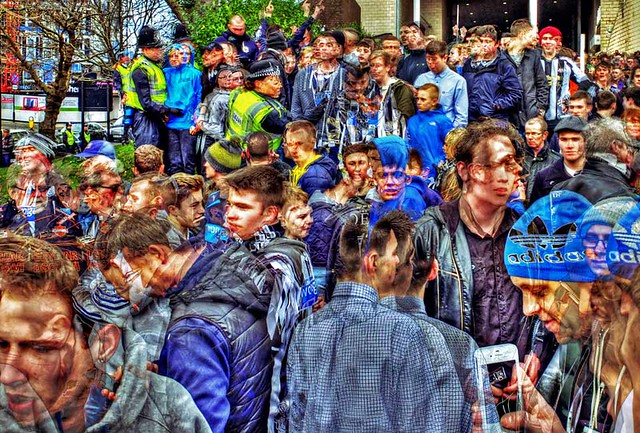
If sport has replaced war and football has replaced the church, meaning is now found in the fierce contests fought in the new cathedrals of modern life. St James’ Park, nestled on a hill, watching over the River Tyne, is the hallowed site of Saturday worship; a heretical space for those whose adoration is reserved for the Stadium of Light, a sacred arena stationed on the consecrated banks of the River Wear.
These two houses of prayer, hope and wonder, whose names recall both canonisation and the Book of Genesis, are separated by a mere twelve miles. Geographical proximity has forced the devoted to express their difference through the choice of black and white or red and white dress, holy book (True Faith or A Love Supreme), and a series of choral hymns sung from the side-lines.
Twice a year, if fortune brings forth glory, the faithful visit one another, armed with their best eleven, who may be bought or on loan from elsewhere, in a sporting contest called the Derby. These vicious encounters are said to reawaken interminable historic battles which stretch back through the centuries. Like the origins of all great religions, the beginnings of such conflict are shrouded in myth, lost in a narration which paints one as good and the other as evil, and which set up a range of dichotomies that stretch from strong/weak, knowing/ignorant, rich/poor to washed/unwashed and human/ape.
Victory and defeat unite all as “we”: “We won!”, “We lost”, “We beat the bastards!”, “We’ll get them next time!” Humanity is reduced to “them and us”. “They” who have caused all our anguish and pain, “they” who will never beat us for we are too strong. Those statistically-minded are armed with objective proof that they are better and have always been more successful. Objectivity is elsewhere refuted, the joys of the game are subjective, personal, unquantifiable, “they may have won but we played better.”
At times, the supposedly unbiased, reasoned assistants of God’s work show all too plainly their humanity, bringing forth errors, disallowing goals, mistakenly calling representatives of the devout offside, and at worst, penalising the faithful with a spot kick. It doesn’t matter if the referee is “right”, giving the penalty is the original sin; the game is now poisoned, and retribution may be sort after outside the church.
Anger at the hands of defeat may provoke disorder, rioting, and the destruction of private property. The faithful may even take up arms in their own city – as last occurred in the notorious month of April 2013 – a battle which can turn man against beast. In such cases, the cavalry attempt to intimidate the crazed populace with horses and dogs, batons and handcuffs, but the devout, in their numbers, can resist containment and obstruct the enemy on their retreat home.
The preceding ninety minutes of combat are here a mere precursor to the “real” fight which will be settled away from the scoreboards and those collecting statistics. Defeat will be avenged, loss will be overturned. This is the reality of this zero-sum game, victory on the field will always be contested afterwards and physical violence may be the only way to wrestle back the pride lost on the pitch.
In containing disorder, the cavalry risk injury; in seeking vengeance, the devoted risk imprisonment. Worst of all, the Association may ban a miscreant for life. The contest then watched from a stool, punctuated by adverts, replayed, analysed, removed, forever distant.
Frustration sets in and the miscreant finds himself unwelcome even in the watering holes. YouTube, Facebook, Twitter – a technological miracle – cushion the blow. 3-0, 2-0, 3-1, 4-1, 5-1. Shearer! Beardsley! Shola! Quinn! Phillips! Fletcher!
Solace found in the forum, in the comment section, in the YouTube rabbit hole whose algorithms bring forth victory, in the glory of being on the right side, among the mass of fellow-travellers united in hatred against the disgusting, shameless, repugnant, vulgar unfaithful.
Relegation brings respite from the eternal battle. The high priests’ avarice jeopardises the faith. Protests, empty congregations, flags, demonstrations. The people ignored, the high priests silent.
Spending promises, a record signing, hope for the future.
Sunderland-Newcastle, Newcastle-Sunderland. The Wear-Tyne Derby, the Tyne-Wear Derby.
Photographs courtesy of Creative Commons, Newcastle Libraries and Sam Leighton.
Check out Part II: A Tale of Two Cities: Newcastle and Sunderland


Excellent! Really enjoyed that, Tom!
LikeLike
Thanks Sheila!
LikeLike